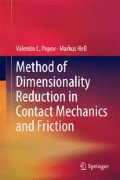Abstract
This chapter is devoted to a rigorous proof of the application procedure of the method of dimensionality reduction to contacts with elastomers. The proof is based on Radok’s principle of functional equations. It proceeds from a solution of a similar elastic problem which then is carried over to the original problem by replacing the material properties. We will show in detail how Radok’s method of functional equations is used for the replacement of the material properties.
Access this chapter
Tax calculation will be finalised at checkout
Purchases are for personal use only
Notes
- 1.
The mathematically sound way consists of taking the incompressibility into account in Eq. (19.29) and only then, taking the Laplace transformation. It is, however, easy to see that this procedure leads to the same result.
References
J.R.M. Radok, Quart. Appl. Math. 15, 198 (1957)
S. Kürschner, A.E. Filippov, Phys. Mesomech. 15, 270–274 (2012)
L.D. Landau, E.M. Lifschitz, Lehrbuch der Theoretischen Physik, Band VII Elastizitätstheorie, 1st edn. (Akademie, Berlin, 1965)
L.D. Landau, E.M. Lifschitz, Lehrbuch Der Theoretischen Physik, Band VI Hydrodynamik, 5. überarb. Aufl. (Akademie Verlag, 1991)
I.N. Bronstein, K.A. Semendjajew, G. Musiol, H. Mühlig, Taschenbuch Der Mathematik, 5. überarb. u. erw. Aufl. (Harri Deutsch, 2000)
W. Yang, J. Appl. Mech. 33, 395 (1966)
R.M. Christensen, Theory of Viscoelasticity: An Introduction (Academic Press, New York, 1971)
E.H. Lee, J.R.M. Radok, J. Appl. Mech. 27, 438 (1960)
B. Gross, Mathematical Structure of the Theories of Viscoelasticity (Hermann, Paris, 1953)
A.C. Pipkin, Lectures on Viscoelasticity Theory (Springer, Berlin, 1972)
D.R. Bland, Theory of Linear Viscoelasticity (Pergamon, Oxford, 1960)
M. Vandamme, F.J. Ulm, Int. J. Solids Struct. 43, 3142 (2006)
Author information
Authors and Affiliations
Corresponding author
Rights and permissions
Copyright information
© 2015 Springer-Verlag Berlin Heidelberg
About this chapter
Cite this chapter
Kürschner, S., Popov, V.L., Heß, M. (2015). Appendix 3: Replacing the Material Properties with Radok’s Method of Functional Equations. In: Method of Dimensionality Reduction in Contact Mechanics and Friction. Springer, Berlin, Heidelberg. https://doi.org/10.1007/978-3-642-53876-6_19
Download citation
DOI: https://doi.org/10.1007/978-3-642-53876-6_19
Published:
Publisher Name: Springer, Berlin, Heidelberg
Print ISBN: 978-3-642-53875-9
Online ISBN: 978-3-642-53876-6
eBook Packages: EngineeringEngineering (R0)

